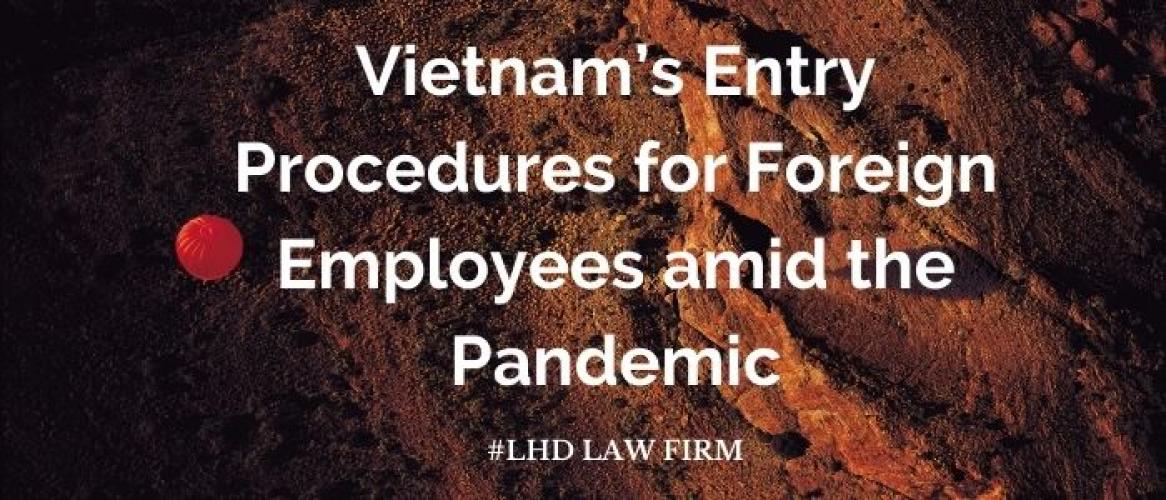Vietnam’s Entry Procedures For Foreign Employees Amid The Pandemic Covid-19
- 02/03/2021

Vietnam’s Entry Procedures for Foreign Employees amid the Pandemic covid-19
 CONTENT
CONTENT
 CONTENT
CONTENT
Vietnam’s Entry Procedures for Foreign Employees amid the Pandemic covid-19...
- Vietnam suspended the entry of all foreign visitors from March 22 and subsequently suspended all international flights.
- However, it has been allowing diplomats, officials, foreign investors, experts, skilled workers, and students to enter the country with special entry permits.
- All travelers, except for those on short term business trips, will be subject to quarantine at a centralized government facility, corporate headquarters, factory, or a designated hotel.
- We recommend employers use a reputable professional firm to deal with the intricacies and administrative procedures of securing entry of their foreign employees.
Vietnam on March 22 suspended the entry of all foreign visitors including those with visa exemption certificates in a bid to contain the COVID-19 pandemic. Subsequently, it suspended all international flights by March 25, effectively locking out visitors and business professionals except for Vietnamese nationals returning on special repatriation flights.
Vietnam’s government, however, has allowed diplomats, officials, business experts, managers, highly skilled workers, and students to come to Vietnam provided they meet the necessary requirements.
With Vietnam containing the pandemic better than most countries and recording 35 deaths, the government has encouraged businesses to resume activities. While the entry ban on foreigners remains in effect the government has also asked the relevant authorities to facilitate the entry of investors, technical experts, high-skilled workers, managers, officials, and diplomats. Nevertheless, Vietnam remains closed to foreign tourists as of now.
Up until September, several foreign experts, managers, and students have been to enter from South Korea, Japan, China, Russia, and so on via special flights.
Most recently, from September 15, as per Notification No 330/TB-VPCP, the government allowed the resumption of six international air routes between Vietnam and Guangzhou (China), Tokyo (Japan), Seoul (South Korea), Taipei (Taiwan), Phnom Penh (Cambodia), and Vientiane (Laos). However, it is important to note that flight schedules are yet to be published and this is likely to be done gradually.
Foreign employees that want to enter Vietnam should ensure they have a sponsor who can assist the employee in obtaining the necessary paperwork and communicate any changes to them.
Since the authorities have not specified any time limit for processing, employers should obtain all the necessary approvals and documents as far ahead as possible so that any delays are limited.
Guidance for employers
We highlight some of the important steps that employers can undertake to facilitate the arrival of their foreign employees:
- The employer is required to submit a letter to the local provincial people’s committee with specific details about the employee job details as well as their travel plans;
- The local provincial people’s committee is then expected to make a decision and then submit the request to Vietnam’s immigration department; and
- If the application is approved, the employer would also need to submit a letter and necessary documents to the immigration department including the local provincial people’s committee decision on the approval.
Additional requirements
The Vietnam government recently issued Official Dispatch No. 3949/CV-BCD on July 24 issuing additional requirements for foreign workers entering Vietnam. As per the directive:
- Foreign workers will have to test for COVID-19 three days before entering Vietnam using the real-time PCR technique. The tests must be done at testing centers approved by their government or at test centers approved by the World Health Organization (WHO);
- All incoming travelers, including Vietnamese nationals, will be required to pay for quarantine as of September 1. International arrivals who opt to stay at government facilities will be required to pay at least VND 120,000 (US$5) per day; and
- Foreign workers should have international health insurance, or their sponsor will be required to pay for treatment in case they are infected with COVID-19.
Quarantine measures waived for short business trips
On August 31, the Ministry of Health issued Official Dispatch No 4674/BYT-MT waiving the mandatory 14-day quarantine for foreign experts, investors, managers, and diplomats if they enter Vietnam for less than 14 days. If after 14 days they wish to stay in Vietnam, they can do so without quarantining, provided they test negative for the virus.
However, they must comply with all other health measures, which include:
- Remain at designated accommodation and follow the scheduled itinerary of the business trip;
- Install and use the Bluezone contract tracing app during their stay in Vietnam; and
- Wear face masks and maintain personal hygiene.
Mandatory quarantine for all other incoming travelers
It is important to note that anyone entering Vietnam is subject to a 14-day quarantine except for those entering on short term business trips of less than 14 days. The quarantine is typically at a centralized government facility or a designated hotel. Testing for COVID-19 is done at least twice during the quarantine period. After serving the mandatory quarantine, the individuals may be under medical surveillance for another 14 days.
In addition, as per Notification No 330/TB-VPCP, foreign experts entering via the aforementioned six international air routes may be subject to a shorter quarantine period of five days, provided they test negative twice after entering Vietnam and in accordance with local health authorities. Following the five days, they will be required to self-quarantine at home or at corporate headquarters.
The government is keen to allow foreigners for business purposes to enter the country. As Vietnam slowly begins to ease travel restrictions, officials in Hanoi, Da Nang, and Ho Chi Minh City have approved several hotels including Le Meridian Saigon, Holiday Inn, IBIS Saigon, and Norfolk to serve as paid quarantine zones.
Due to the pandemic, this is the first time that such strict travel restrictions have come into play and as such, there is no precedence for similar restrictions.
We recommend that investors and businesses use a professional firm to navigate the intricacies and administrative procedures to help secure an entry permit for their foreign employees.
Besides, with several countries easing travel restrictions, regulations are likely to change quickly. We, therefore, recommend that businesses follow us and check this space for any updates or changes to the current regulations.


0 comment